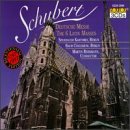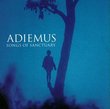| All Artists: Franz [Vienna] Schubert, Hans Gillesberger, Martin Behrmann, Bach Collegium Japan, Leverkusen Capella Vocale, Spandau Kantorei (Berlin), Berlin Bach Collegium, Hamburg Vocal Capella, Vienna Symphony Orchestra, Christian Schlicke, Elisabeth Thomann, Eva Csapo, Yasko Nagata, Kari Lovaas, Stafford Wing, Peter Maus, Karl-Ernst Mercker, Alejandro Ramirez, Richard Greager, Richard Graeger Title: Schubert: The 6 Latin Masses Members Wishing: 0 Total Copies: 0 Label: Vox (Classical) Release Date: 2/4/1997 Genre: Classical Style: Opera & Classical Vocal Number of Discs: 3 SwapaCD Credits: 3 UPC: 047163304026 |
Search - Franz [Vienna] Schubert, Hans Gillesberger, Martin Behrmann :: Schubert: The 6 Latin Masses
 | Franz [Vienna] Schubert, Hans Gillesberger, Martin Behrmann Schubert: The 6 Latin Masses Genre: Classical
|
Larger Image |
CD DetailsSimilar CDs
Similarly Requested CDs |
CD ReviewsGreat price but there are some drawbacks Aaron Breer | 08/30/2006 (3 out of 5 stars) "This is good but be aware that the German mass on this recording was recorded in 1962 and the rest of the masses in 1978. The sound quality isn't the best in the world but I'm sure to most people it will be tolerable. It's just that after hearing such good quality new recordings it's kind of hard to stomach an old analog recording. The performance is good, probably not the best though. The singers seem to really over power the instruments. some times the instruments just seem a little small. There is some background noise just like on most recordings but it's nothing terrible. I actually recommend the Brilliant Classics Schubert Masses. The sound quality is much better in that box set and it only costs a couple of dollars more." Possibly Schubert's most intimate work! G. Shkodra | Montreal, Canada | 10/06/2005 (5 out of 5 stars) "These masses are Schubert's hymn-like works with an enormous melodic charm. He composed part of them to texts of Johann Philip Neumann, who was a professor at the Vienna Polytechnical Institute, and they were intended for use by the students congregation at that Institute. He finished the first mass when he was only 17 and the last one just a few months before he died, so his masses, the latin as well as his german ones, really span over a relatively long time of the creative part of his career. Technically speaking these masses seem easy, but they surely rank among Franz Schubert's best works. They certainly constitute a very mature body of work, most part of which written by the great composer towards the end of his short but very prolific life. The choral part is not overly complex, and so is the orchestral one. To me the beauty of these works is in the interaction between choral, solos and orchestral sections. Sometimes a simple work can be magnificent. I'm not a regular churchgoer, but just like another reviewer here at Amazon.com, I happened to attend a few masses in Stuttgart and Ludwigsburg, Germany, more than a decade ago. Masses in german and english, the softly spoken magic spell accompanied by Schubert's masses. What a blissful atmosphere! When I think about it, it's very difficult to describe that feeling now, but I guess "intimate" would be the word that comes closest to it." Franz Schubert's "Deutsche Messe" Ursula | Waco, Texas | 06/16/2000 (5 out of 5 stars) "I have listened to the "Deutsche Messe" over and over again. I also had the rare opportunity to be at a mass in a church in Germany where an orchestra played Franz Schubert's "Deutsche Messe". Wow! What an experience! The music pieces have so much depths and devotion in them. You can close your eyes and feel what Franz Schubert must have felt."
|

 Track Listings (22) - Disc #1
Track Listings (22) - Disc #1





